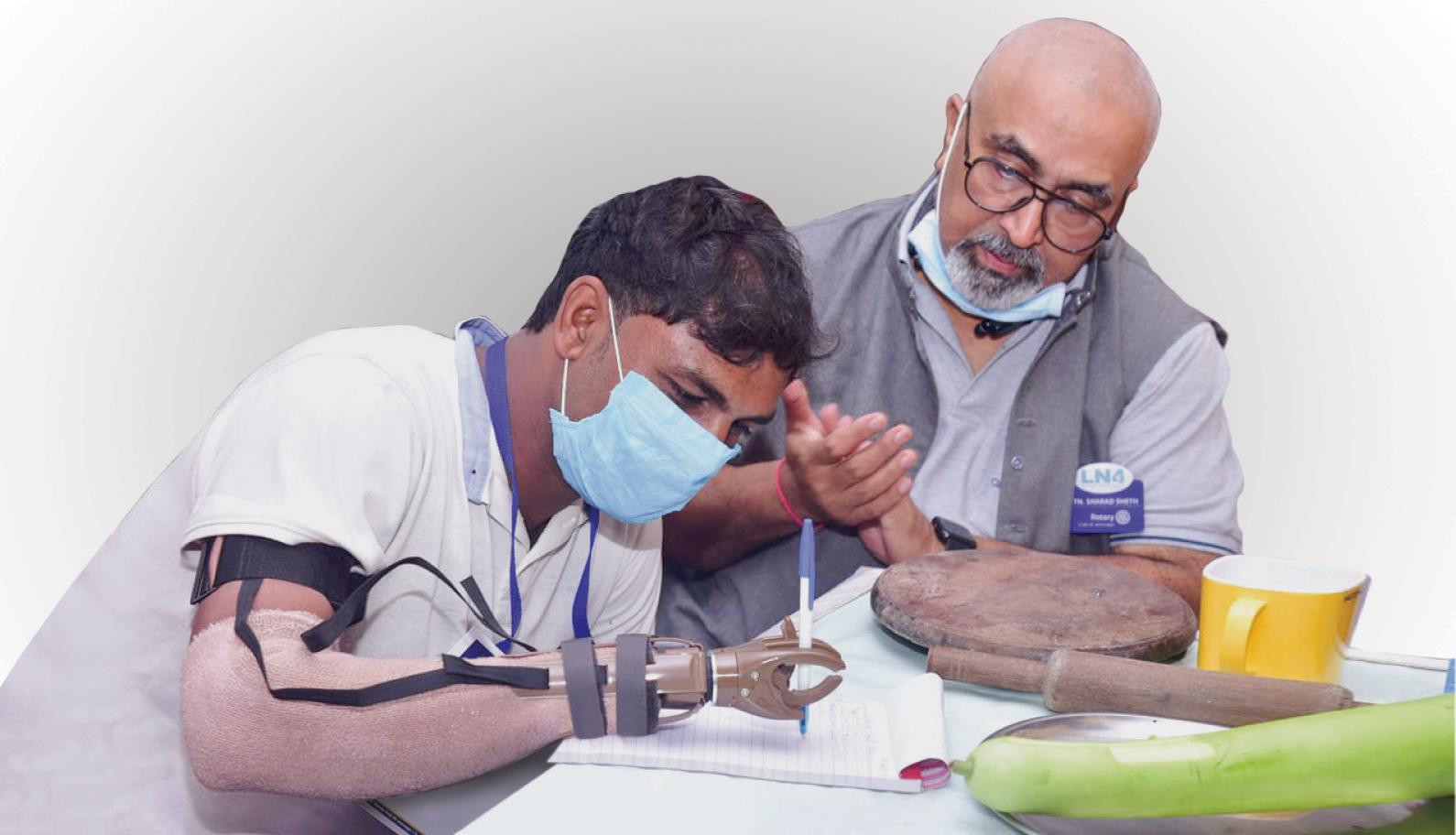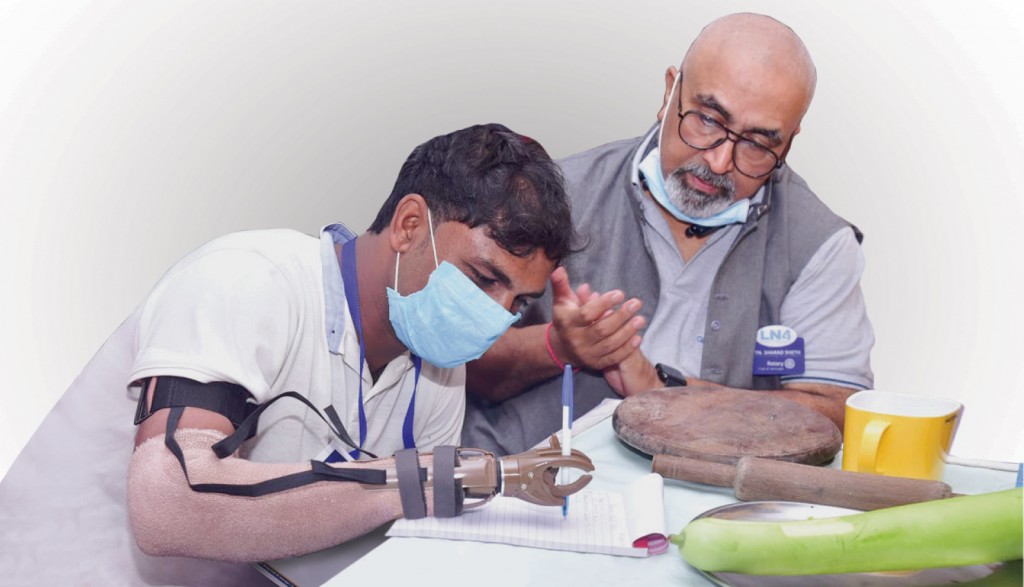
Sometime before the festival of Rakhi this year, Ajay Agarwal, past president of RC Rourkela Royal, RID 3261, while scanning through his Whatsapp messages was stuck by a particularly moving message. It contained the video of a Cadbury ad in which a little girl ties rakhi on the wrist of her little brother.
The only difference in this particular visual was that the little boy has experienced the thrill of his sister tying the thread of love around his wrist for the first time, because only recently, the child who had lost both his arms, had been fitted with a prosthetic hand, enabling his sister to tie the rakhi. What was more, the sensor fitted on the prosthetic hand, allowed him to feel the thrill of the sense of touch of the soft thread of the rakhi.
Cadbury had tied up with Social Hardware, an organisation working for providing assistive devices and rehabilitation services to underprivileged communities, to develop a unique sensor-based prosthetic arm that enables the person to feel the sense of touch.
“Watching this video, I got excited as we know very well that when we suffer a fractured arm, a frozen shoulder or are troubled by disabling pain, we get frustrated, irritated and start cursing our bad luck,” says Agarwal.

The Rotarian started thinking about the repercussions for people who have lost their hands due to either an illness, an accident or are born without them. “While we feel sympathy for those who have only stumps for hands or lost them altogether, we can never really imagine what a herculean task it must be for them to carry on their daily routine… something that we take for granted. This disability makes them dependent and affects the whole family.”
While researching a prosthetic hand, which can help an affected person return to a near-normal life, Agarwal came across the LN4 prosthetic hand, which is low-cost, light, durable, easy to fit and remove and functional. “I found that Ernie Meadows, who along with Michael Mendonca and Maurice LeBlanc, an award-winning mechanical engineer focused on assistive technology with special interest in upper limb prosthesis, worked tirelessly to develop a hand that was not too expensive but did not compromise on quality.”
‘LN4’ gets its name after Ernie’s daughter Ellen, who died in an automobile accident when she was only 18.
(Ernie then set up the ‘LN4 Hand Project’ to provide “everyone who requires a prosthetic hand to have one, regardless of their socioeconomic status or ability to pay. We manufacture a durable yet rudimentary prosthetic hand with no electric parts, and with the help of our partners, distribute it across the globe. We partner with organisations and individuals in developing countries who have less access to prosthetic limbs,” says their website.)

The Ellen Meadows Prosthetic Hand Foundation has been fitting hands since 2005 through Rotary across the world. The prosthetic hand, which costs around ₹25,000, is given totally free of cost to Rotary clubs to help people without hands. Of the 65,000-plus hands fitted across the world, about 24,000 have been gifted to India.
He soon identified Mohan Kumar, a member of RC Bangalore (RID 3190), the key person to get LN4 hands free from the US through this charitable organisation. Way back in 2008–09, the Rotary clubs of Sholapur, Pune, Jaipur and Jamnagar took up LN4 project proactively. Thanks to their initiative, interest and hard work, the LN4 prosthetic limb project has been done in every corner in India, says Agarwal.
So his club, along with RC Rourkela Queens, which has been sponsored by their club, decided to organise an ambitious camp to fit LN4 hands on around 200 people in Rourkela. “The camp was actively supported by RC Jamnagar (RID 3060), which sent a couple of their members, who are experts in this work, to Rourkela to assist with the camp.” He clarifies that unlike the prosthetic hand fitted with a sensor in the Cadbury ad, the hands they fitted are basic versions minus the sensors.
Once a date — Nov 28 — was fixed, the first task was to identify the recipients. Information about the camp was circulated through various ways including getting help from Member of Parliament Juel Oram, and Rourkela MLA Sharada Prasad Nayak, President Rourkela Chamber of Commerce and Industry Praveen Garg, RID 3261 DG Sunil Phatak and several PDGs of the district to send out messages about the camp. “The media, both electronic and print, supported our publicity drive. Posters were put up, pamphlets were distributed and we sought the help of the local administration and the Regional Research and Rehabilitation Centre to get lists of disabled people who had lost their arms/hands. We wanted as many beneficiaries as possible to avail this first ever opportunity being offered in the state of Odisha,” says an excited Rashmi Agarwal, president of RC Rourkela Queens.

A core project team was formed and the Rotarians started reaching out to the beneficiaries. They were happy that most of the people who needed help were from the rural and tribal areas of Odisha. While the prosthetic hands were given free of cost, they had to raise around ₹4.5 lakh to fund the camp, which included covering the cost of the visiting Rotarians from Jamnagar led by Rtn Sharad Sheth, giving breakfast, lunch and snacks to the recipients who had come from far-flung areas early in the day.
Agarwal explains that for this device to be successful, recipients must have 14 cm of residual limb below the elbow to utilise this prosthetic device, to assure a strong fitting for the cuff. Additionally, there can be no remaining fingers, thumb, or wrist, as these will interfere with the cuff. Finally, the arm should be flexible and fully healed with no open sores or bandages to interfere with the attachment. “An innovative work-around” called an elbow extension, allows people who do not meet these criteria to get fitted with the LN4 hand. This elbow invention allows providing a prosthetic device to a greater range and number of upper limb amputees,” he says.
At the end of the day, even though the organisers were prepared to serve 200 people, only 110 persons could be fitted with the LN4 prosthetic hands, as some lacked the required criteria of the deformity which facilitates fitment. “For the first time, two clubs in Odisha have come together to do a project of this magnitude. The kind of media coverage we got will really enhance Rotary’s public image,” he beams.

Etching an image of the day when the camp was held, Ajay Agarwal, who is also the project chief, says, “On that pleasantly cold November winter morning, we were all geared up for our ‘Helping Hand’ project. The Jamnagar team led by Sharad Sheth, and the two local club members were there in their sea green Rotary t-shirts. The beneficiaries were checked, given masks and sanitisers, and after data completion, led to the LN4 hand fitting tables.” The Jamnagar members, expert in this task, began the job, and taught the Rourkela Rotarians the art of fitting prosthetic hands, and soon they too started fitting the hands.
As for the causes, the Rotarians found these to be industrial accidents, electrocution and “some were born that way. A few did not have both hands while many had lost their major hand. Almost all of them were compelled to live a home-bound life.”
At the camp, nurses from Jaypee Hospital, a reputed local hospital, along with the Jamnagar team and local Rotarians spent a lot of time with the beneficiaries to train them on how to perform simple day-to-day chores like peeling vegetables, rolling out a roti, holding a pen and so on. “Many of them signed on the expression board with their newly-acquired hand and some even wrote words of gratitude. It was immensely satisfying to witness some of the beneficiaries eat breakfast and lunch with their LN4 hand,” he adds.
Perhaps the most heartening sight for the Rotarians was watching Gita, whose infant was being held by a companion when she came in for the fitment. “After she got the gift of a free LN4 hand, she cradled her own baby for the first time. It was a very emotional moment not just for her but all of us who witnessed this moving sight,” says Nigam Agarwal, president of RC Rourkela Royal.
Another moment of immense satisfaction came while watching a hockey player “who was so passionate about the game that he was playing with one hand. He held the mop (kept for training) with both hands and was excited to finally hold it like a hockey stick with both hands. He now hopes to improve his game.”
But their work is not over with the fitment of the hands. “We have to now follow up on the people who have been fitted with these hands, about how they have adapted and are using them. Maybe after six months or one year we will organise another camp. We hope to make this a permanent project,” says Nigam, emphasising that the camp was much more than just fitting of prosthetic hands. It also involved training and counselling on how their lives would now change forever.
By the time the dignitaries walked in for the inaugural session, quite a few beneficiaries were waiting with newly-fitted LN4 hands. Collector and district magistrate Nikhil Pawan Kalyan, ADM Rourkela, Commissioner of RMC Divya Jyoti Parida and SP, Rourkela, Mukesh Kumar Bhamoo attended the inaugural and appreciated the service extended to the community. Significantly, some of the beneficiaries had come from the neighbouring states of Jharkhand and Chhattisgarh.
The concluding session of the camp was attended by Rourkela MLA Nayak and DGN Manjeet Singh Arora.
The Rotarians truly got a taste of this year’s RI theme — serve to change lives. “We felt that till now we have been a part of so many projects done by our individual clubs but none was as life-changing as this one. We could feel that this project would have a long-lasting impact on the lives of beneficiaries and that made the camp so special,” Agarwal added.






